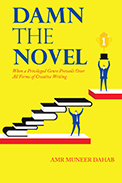
 |
Damn the Novel: When a Privileged Genre Prevails Over All Forms of Creative Writing
by Amr Muneer Dahab
AuthorHouse
In this volume of forty-five short essays of literary criticism, the author, writing from a distinctly Sudanese-Arabic sensibility, asserts his case that the novel has superseded the other, more clearly-superior genres of poetry and the essay based on the greater public exposure novels receive, which virtually guarantees their marketability and profitabilty. The unfortunate commercialization of novels in the form of popular television and cable mini-series adaptations obscures the finer literary qualities of these works; the market simply churns out a constant machine-like supply of stories for the public to consume. Given this public thirst for novels, Dahab bemoans the lack of relative and substantial submission opportunities for writers in other genres; both the short fiction and poetry markets offer equally scant opportunities for getting new talent into the public eye. He also laments the ongoing blurring of genres as he asserts that “[t]he value and the pleasure of any artistic or literary genre do come from their unique distinctiveness, not from taking all the light on the stage through pushing the other arts to the dark corners.”
This blurring of genre boundaries is topical, given that “creative nonfiction” and “flash fiction” are relatively new categories that obfuscate the definitions of traditional genres even further. As such, this essay collection might have used “Genre Wars” as an alternate title. Many of these essays could be read as standalone pieces that might provide opportunities for undergraduate English faculty to use them with students in a literary theory course, a seminar on multicultural literature, or a special topics theme-based course. A recurring theme throughout the volume asserts that poetry still represents the summit of literary achievement, largely because of the talent necessary to compose works that transcend centuries by way of the aesthetic pleasures such works impart to new generations of readers.